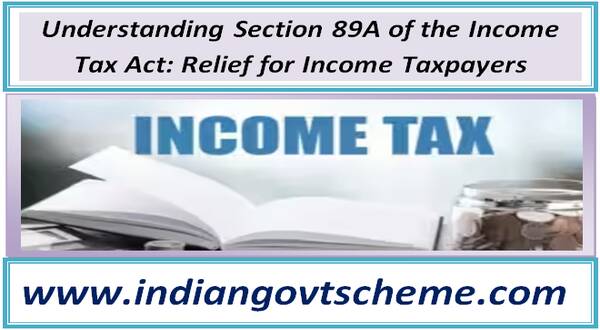Understanding Section 89A of the Income Tax Act: Relief for Income Taxpayers
Section 89A of the Income Tax Act pertains to relief for income taxpayers. It primarily addresses relief when the taxpayer receives arrears or advance salary. This provision ensures fair taxation by spreading the tax liability over the years to which the arrears pertain. Essentially, it prevents a significant tax burden in the year the arrears are received, thereby easing financial strain on the taxpayer. Section 89A calculations are crucial for accurately determining tax liabilities, ensuring taxpayers aren’t unduly penalized or burdened due to irregular income patterns. This provision aims to provide equitable treatment to taxpayers facing fluctuations in their income streams.

Outstands of Indians move abroad, while many others return home after retirement. To support those who have returned, Section 89A of the Income Tax Act (ITA) offers specific tax relief related to foreign retirement benefit accounts. This provision simplifies legal and tax complexities, providing a framework for deductions and savings. This article delves into Section 89A of the ITA, offering insights on how to save on taxes for foreign retirement income.
What is Section 89A of the Income Tax Act?
The Finance Act, 2021, introduced Section 89A of the Income Tax Act to assist residents with income from foreign retirement benefit accounts. In some countries, this income is taxed upon receipt, creating a mismatch with India’s accrual taxation system and complicating foreign tax credit claims. Section 89A addresses this issue by stipulating that income from specified accounts will be taxed according to the rules set by the central government, ensuring alignment with the tax policies of the country where the account is held. Countries notified for Section 89A by the Central Board of Direct Taxes (CBDT) include the US, the UK and Canada. The CBDT issued Rule 21AAA and Form 10-EE for NRIs to claim relief under Section 89A concerning income from foreign retirement funds.
Section 89A of the Income Tax Act: Key terms
Specified Person: This pertains to a resident who, while being a non-resident in India, established a specified account in a country notified by the central government.
Specified Account: A specified account is one maintained in a notified country, specifically for retirement benefits. The income from this account is not taxed in India upon receipt. Instead, taxation occurs in the notified country at the time of withdrawal.
Notified Country: This is a country designated by the central government for taxation purposes under Section 89A.
Section 89A of the Income Tax Act: Rule 21AAA
Rule 21AAA outlines that any income accrued in an overseas retirement benefits account is included in the taxpayer’s total income for the previous year. This income is taxed upon withdrawal or redemption in the notified country where the account is held. However, certain exclusions apply:
Income already taxed in previous years under the ITA.
Income not taxable in India during the accrual year, either because the taxpayer was a non-resident or a resident but not ordinarily resident (RNOR) during the previous year or due to the applicability of Double Tax Avoidance Agreements (DTAA).
Section 89A of the Income Tax Act: Form 10-EE
Under Section 89A, taxpayers need to electronically file Form 10-EE before submitting their ITR. Once this option is chosen, it applies to all subsequent years and cannot be reversed.
However, if the taxpayer becomes a non-resident after selecting the option, it is considered as if the option never existed. Consequently, the income accrued in the specified account from the year in which the option was exercised becomes taxable for the relevant previous year.
The updated ITR forms include amendments to Schedule S (details of income from salary) and Schedule OS (other source income), enabling taxpayers to claim relief from taxation under Section 89A. Taxpayers need to declare the gross income accrued from salary, interest, capital gains or dividend income and claim relief under Section 89A to defer tax on such income until withdrawal.
Section 89A of the Income Tax Act: Things to remember
- The process entails filing Form 10-EE before submitting the ITR.
- Once opted for under Section 89A, it applies to all ensuing years and cannot be retracted.
- Should a taxpayer transition to non-resident status after opting, the prior election is nullified. Consequently, income accrued in specified accounts becomes taxable from the years when the choice was made.
Section 89A of the Income Tax Act serves as a vital provision for residents dealing with income from foreign retirement benefit accounts. This article sheds light on the essential aspects of Section 89A, offering insights into how individuals can save on taxes concerning foreign retirement income. By addressing the complexities of taxation for such accounts and providing guidelines for relief, Section 89A simplifies the process. Additionally, Rule 21AAA and Form 10-EE play crucial roles in facilitating the application of Section 89A, ensuring compliance with tax regulations. As taxpayers explore the options under Section 89A, it is essential to remember the procedural requirements and implications of the choices, including the irrevocability of the choice made. Overall, Section 89A serves as a valuable tool for individuals managing income from foreign retirement benefits, offering relief in navigating tax obligations.
नोट :- हमारे वेबसाइट www.indiangovtscheme.com पर ऐसी जानकारी रोजाना आती रहती है, तो आप ऐसी ही सरकारी योजनाओं की जानकारी पाने के लिए हमारे वेबसाइट www.indiangovtscheme.com से जुड़े रहे।
